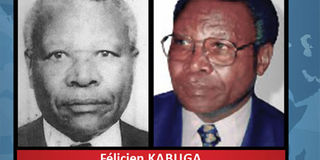Kabuga: Intriguing question is how he eluded capture for so long

Rwandan fugitive Félicien Kabuga. PHOTO | UN
What you need to know:
- French police, who say they identified him through a DNA test, which matched a sample "taken when he was hospitalised in Germany in 2007".
- The real Satans are those who activate and incite that rabble, and then seek to rationalise the mass murder. Kabuga belongs in that category.
Can you picture 800,000 people living in a geographical space smaller than Kitui County being slaughtered within three months?
That's a terribly huge number of people to kill. And the rate of the slaughter - nearly 10,000 killed daily - frightfully fast. For a tiny country like Rwanda, the human loss is incalculable.
I am of course recalling the 1994 Rwandan genocide, a seminal horror like no other Africa has seen in modern times.
A giant step in the long, torturous journey to closure - if that can ever happen - was taken on May 16. It happened to be an early morning in Paris when French gendarmes broke into a flat, where they arrested an 84-year-old Rwandan man who was anonymously living there. His name is Félicien Kabuga. And he had been on the run for 26 years.
Kabuga is no ordinary person. At the time of the genocide, he was Rwanda's richest man, a position that guaranteed him key membership in "Akazu", the elite Hutu brotherhood that controlled Rwanda.
Among his holdings was RTLM (Radio Television Libre des Mille Collines), a radio station whose highly inflammatory broadcasts were responsible for fanning the flames of the genocide.
Worse than that, he was the main financier of the "interahamwe" deaths squads that did much of the killing.
ELUDING CAPTURE
Understandably, he has remained at the very top of the list of Rwanda's most wanted genocide masterminds as the two-and-a-half decade manhunt for him went on, spanning Africa and Europe. The US, on its part, had placed a $5 million (Sh534 million) bounty on his head.
French intelligence agents found out Kabuga's hideout by tracking his children living in Belgium. One had rented a flat near her father's. Wiretaps and surveillance confirmed Kabuga was indeed living in the building.
Fugitives like Kabuga elude capture by posing under numerous aliases and disguises. They must keep changing addresses, using false names.
Some of the countries Kabuga is alleged to have spent time in incognito before he disappeared to Europe are Gabon, Cameroon - and Kenya.
Kenya's entanglement in this man's sordid saga became public in 2003. It so happened the US FBI had hatched a plan with a Nairobi-based local informer, who had met Kabuga to coax him out from his lair in the city and nab him.
The plan was to lure him to the informer’s residence on the pretext of signing a business deal. But that was not to be.
The informer was murdered by unknown people before his rendezvous with Kabuga. Reportedly, the FBI was of the view a senior Kenyan security bureaucrat had tipped off Kabuga and his local protectors.
IMPOSSIBLE ODDS
Last Wednesday in Paris, Kabuga was brought to court, on a wheelchair and wearing a face mask. It was the beginning of what will certainly be a gripping legal drama. Another hearing is due this week.
Already the legal battle lines are drawn. The International Residual Mechanism for Criminal Tribunals (IRMCT), a leftover of the tribunals set up to deal with genocidal criminals in the former Yugoslavia and Rwanda, considers itself to have the competent jurisdiction over Kabuga and wants France to transfer him to them.
The IRMCT operates from two locations: The Hague and Arusha (Kabuga is likely to eventually land at the latter).
Of course Rwanda would be extremely keen to lay her hands on him and conduct the trial herself. After all it is where the crimes Kabuga will answer for were committed.
Kabuga faces impossible odds in escaping guilt. For a start, the translations of those old inflammatory screeds broadcast by his RTLM radio are damning enough. In any event, why be on the run for a quarter of a century?
The intriguing question is how Kabuga managed to elude his pursuers for so long. Who were his enablers?
ACCOMPLICES
The IRMCT says he was using no less than 20 aliases and multiple - and genuine - passports, at least three of them from African countries. Which countries are these?
Another intriguing detail came from the French police, who say they identified him through a DNA test, which matched a sample "taken when he was hospitalised in Germany in 2007".
Aha, who is this who found out Kabuga had been in Germany and why didn't they apprehend him then? Again, when and how did he manage to gain entry into France? Could that have happened without accomplices?
It was the philosopher Hannah Arendt who wrote insightfully about the "banality of evil", its deceptive 'ordinariness'.
The most evil people are not the mindless maniacs who chop your head with a machete, or burn down the church where your wife and children have taken refuge.
The real Satans are those who activate and incite that rabble, and then seek to rationalise the mass murder. Kabuga belongs in that category.





